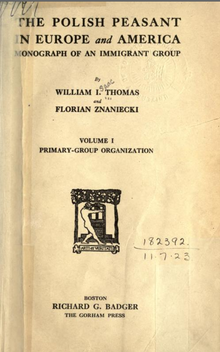Florian Znaniecki
Florian Witold Znaniecki (15 January 1882 – 23 March 1958) was a Polish and American philosopher and sociologist who taught and wrote in Poland and in the United States.
[2] He won international renown as co-author, with William I. Thomas, of the study, The Polish Peasant in Europe and America (1918–1920), which is considered the foundation of modern empirical sociology.
[8][9][10] A poem of his, "Do Prometeusza" ("To Prometheus"), was included in a 1900 anthology; however, neither he in later life, nor literary critics, judged his poetry outstanding.
[10] He entered the Imperial University of Warsaw in 1902, but was soon expelled after taking part in protests against the Russian administration's curtailment of student rights.
[11] During that period, he was briefly an editor at a French-language literary magazine, Nice Illustrée (late 1904 – early 1905);[5][12] faked his own death; briefly served in the French Foreign Legion in Algeria; and worked at a flea market, on a farm, in a traveling circus,[5][12] and as a librarian at the Polish Museum in Rapperswil, Switzerland.
[19] In 1909, aged 27, he published his first academic paper, Etyka filozoficzna i nauka o wartościach moralnych ("Philosophical Ethics and the Science of Moral Values");[20] a year later, he published Zagadnienie wartości w filozofii (The Question of Values in Philosophy), based on his doctoral dissertation,[5][16] and a paper, Myśl i rzeczywistosc ("Mind and Reality").
[21] In 1912, he published a new book, Humanizm i Poznanie (Humanism and Knowledge), and a paper, Elementy rzeczywistości praktycznej ("Elements of Practical Reality").
[21] A year later, he published an annotated translation of Henri Bergson's Creative Evolution[22] and a paper, Znaczenie rozwoju świata i człowieka ("The Meaning of World and Human Development").
[29] A year earlier, in 1913, Znaniecki had met William I. Thomas, an American sociologist who had come to Poland in connection with his research on Polish immigrants in the United States.
[29][30] In July 1914, just on the eve of World War I, Znaniecki left Poland to work with Thomas as a research assistant.
[38] Znaniecki contributed to Thomas' book, Old World Traits Transplanted, and published an anonymous solicited article on that topic in the February 1920 Atlantic Monthly.
[42] He proposed creating a novel Institute of Sociology, but bureaucracy and communication delays resulted in that idea being shelved, and he was offered a philosophy professorship at the newly organized Adam Mickiewicz University in Poznań.
[43] In 1920, Znaniecki returned to the newly established Second Polish Republic, where at Poznań University he soon became Poland's first chair in sociology.
[2] Keeping in touch with American sociologists, Znaniecki lectured as a visiting professor[52] at Columbia University in New York City in 1932–34 and during the summer of 1939.
[54] He then moved to the University of Illinois at Urbana-Champaign and in 1942, obtained American citizenship, allowing him to transition from a visiting to a regular professorship.
[49] Szacki notes that Znaniecki sought to bridge a number of gaps: between empirical sociology and more theoretical approaches; between objectivity and subjectivity; between humanistic and naturalistic methodologies and viewpoints; and between American and European intellectual traditions.
[63] Znaniecki's most famous work remains The Polish Peasant in Europe and America (1918–1920), co-authored with William I. Thomas.
[49] The Polish Peasant in Europe and America (1918–1920), a five-volume work which he wrote with Thomas, is considered a classic of empirical sociology.
Most of his other works focused on theory, the only other notable exception being Miasto w świadomości jego obywateli (The City in the Consciousness of its Citizens, 1931).
[2][77] Unlike Max Weber, he did not believe that everything can be reduced to social actions; he was also quite skeptical of any insights coming from the science of psychology, which he held in low esteem.
[77] The four major forms of cooperative interaction, or four social systems, in growing complexity, were: The four-category division described above appeared in his 1934 book, The Method of Sociology.
[72][83] Znaniecki coined the term "humanistic coefficient" for a method of social research by way of data analysis that emphasizes participants' perceptions of the experience being analyzed.
By that time, Znaniecki saw the cultural order as "axionormative", a universal concept encompassing “relationships among all kind of human actions” and the corresponding values.
[9] His Cultural Reality (1919) was a synthesis of his philosophical thought,[39] but the simultaneous publication of his much more popular The Polish Peasant in Europe and America (1918–1920) associated his name in academic circles primarily with sociology rather than with philosophy.
[93] Szacki notes a puzzling gap in Znaniecki's research: while he was well-read in, and engaged with, most previous and current theories, he largely ignored the works of some notable sociologists of his time such as Max Weber, Vilfredo Pareto and Talcott Parsons.
[63] On the other hand, his works engaged closely with those of William I. Thomas, Georg Simmel, Robert E. Park, and Émile Durkheim.

